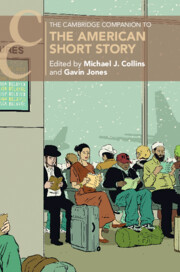Book contents
- The Cambridge Companion to the American Short Story
- The Cambridge Companion to the American Short Story
- Copyright page
- Contents
- Figures
- Tables
- Contributors
- Chronology
- Introduction
- Part I Contexts
- Part II Histories
- Part III People and Places
- Part IV Theories
- Chapter 17 Short Fiction, Language Learning, and Innocent Comedy
- Chapter 18 The Technology of the Short Story
- Chapter 19 Homelessness
- Chapter 20 The Human and the Animal
- Chapter 21 The End of the Story
- Chapter 22 The Affordances of Mere Length
- Notes
- Further Reading
- Index
- Cambridge Companions to…
- References
Chapter 18 - The Technology of the Short Story
From Sci-Fi to Cli-Fi
from Part IV - Theories
Published online by Cambridge University Press: 11 May 2023
- The Cambridge Companion to the American Short Story
- The Cambridge Companion to the American Short Story
- Copyright page
- Contents
- Figures
- Tables
- Contributors
- Chronology
- Introduction
- Part I Contexts
- Part II Histories
- Part III People and Places
- Part IV Theories
- Chapter 17 Short Fiction, Language Learning, and Innocent Comedy
- Chapter 18 The Technology of the Short Story
- Chapter 19 Homelessness
- Chapter 20 The Human and the Animal
- Chapter 21 The End of the Story
- Chapter 22 The Affordances of Mere Length
- Notes
- Further Reading
- Index
- Cambridge Companions to…
- References
Summary
This chapter explores the origins of the US science fiction short story in transnational print networks featuring Mary Shelley, H.G. Wells, Jules Verne, and Edgar Allan Poe. Throughout, we highlight the significance of women writers such as Lydia Maria Child, Judith Merril, Ursula K. Le Guin, and Octavia E. Butler. The chapter examines how struggles over science and technology shape popular turn-of-the-century stories of young white man inventors and the mostly white man-focused twentieth-century pulp magazine Amazing Stories and Astounding Stories. We connect W. E. B. Du Bois’s “The Comet” to a long genealogy of US science fiction written by Black people, including earlier writers such as Martin Delany as well as later ones such as Samuel Delany. The conclusion considers anthologies and projects such as solarpunk that revitalize the genre by imagining the social effects of changes in science and nature in relation to new forms of technology, collaboration, and social movement activism.
Keywords
- Type
- Chapter
- Information
- The Cambridge Companion to the American Short Story , pp. 283 - 297Publisher: Cambridge University PressPrint publication year: 2023

